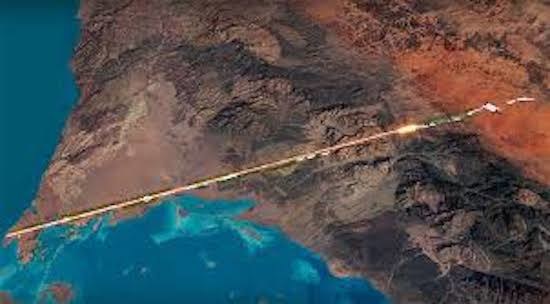Neom’s futuristic ‘Line’ in the sand is good news for Saudi Arabia’s tech start-ups

https://arab.news/mpexg
Digitalization is transforming Saudi Arabia, where a young, tech-savvy population and public-sector economic reforms like Vision 2030 and the government’s ICT strategy aim to grow the Kingdom’s tech sector by an astounding SR50 billion ($13.33 billion) over the next four years.
But big ambitions require big challenges and the Kingdom’s recently announced plan to build The Line — a 173km high-speed transport and data corridor through northwest Saudi Arabia — is just the kind of bold, visionary project that will sustain the expanding tech sector.
Not only will the infrastructure corridor in the desert give shape, form and purpose to the futuristic smart city Neom on the Red Sea — The Line is also sure to act as a lightning rod for investment and inspiration for Saudi Arabia’s growing entrepreneurial class.
That is the consensus of the Saudi tech start-ups we support closely at Wa’ed, the entrepreneurship arm of Saudi Aramco. Since 2011, Wa’ed has deployed SR375 million to Saudi entrepreneurs through no-collateral loans, venture capital investments and incubation training.
Many of them see the multi-billion-dollar urban road, rail and internet backbone driving the adoption of artificial intelligence (AI), robotics, The Internet of Things, the cloud, blockchain, and a host of other emerging technologies.
The Kingdom is a fertile ground for tech innovation. More than 70 percent of Saudi residents are under 30 years old. An astounding 93 percent are connected to the internet, while the global average is closer to 53 percent.
Wassim Basrawi
That a cutting-edge, three-level superhighway of moving people, freight and data will be built in Saudi Arabia is no coincidence, but more convincing proof of the traction being achieved by the Kingdom’s ongoing digital transformation, which has changed daily life over a decade.
The Kingdom is a fertile ground for tech innovation. More than 70 percent of Saudi residents are under 30 years old. An astounding 93 percent are connected to the internet, while the global average is closer to 53 percent. There are about 15 million more mobile phones than people in the Kingdom.
In Saudi Arabia today, you can do almost everything online: Register a business, renew a car registration, even attend court hearings and trials by web or mobile app. Some innovations were developed during the coronavirus disease pandemic, but many preceded it and are likely to outlive the virus.
Consider Hazen.ai, a Makkah start-up supported by the Wa’ed Ventures venture capital fund whose smart, AI-based traffic management and video analysis systems make highways and roads safer. Hazen’s products beat out international competitors in November to win the prestigious Global Best Use of AI in Traffic Safety Award from the International Road Federation.
Sohaib Ahmad Khan, Hazen.ai’s chief executive and co-founder, said giga projects like The Line will drive expansion of Saudi Arabia’s IT sector for years to come. “A project of this scale definitely has immense potential in boosting the local technology eco-system,” he added.
Time will tell whether The Line translates into new business for Hazen.ai. The corridor is supposed to become the high-tech backbone of a smarter urban grid, one without roads — and traffic.
But like many Saudi entrepreneurs these days, Sohaib is undaunted. Optimism is the currency of the moment. “Saudi Arabia is a land of opportunity,” he said. “One thing I can assure you is, we will be investigating what opportunities are there.”
- Wassim Basrawi is the CEO of Wa’ed, the Saudi Aramco Entrepreneurship Center.









































